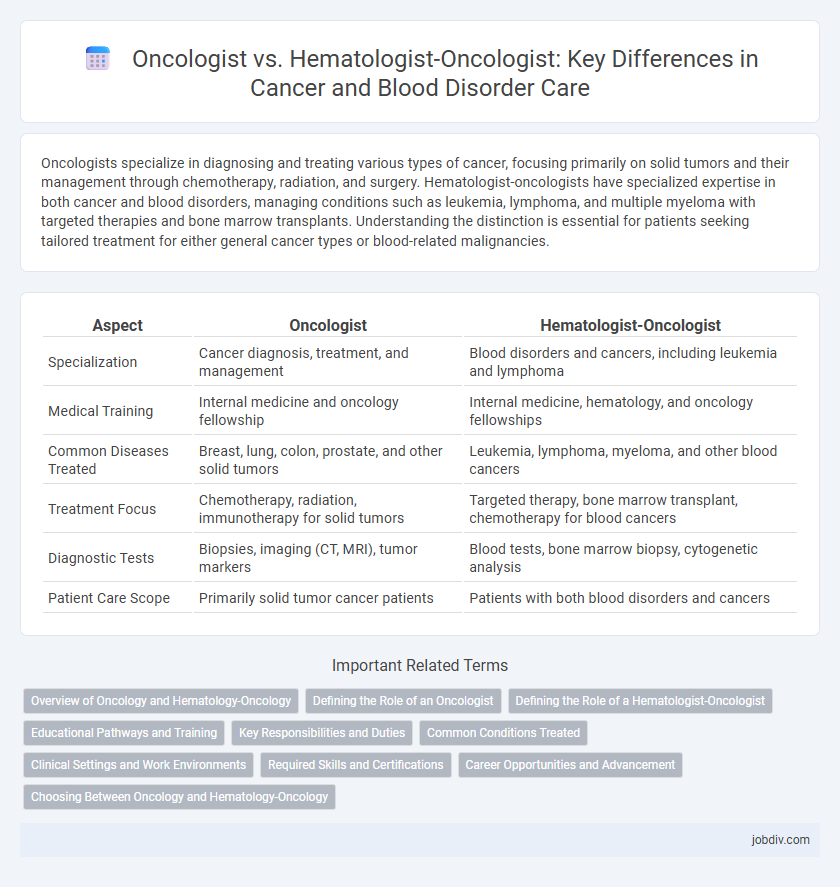Oncologists specialize in diagnosing and treating various types of cancer, focusing primarily on solid tumors and their management through chemotherapy, radiation, and surgery. Hematologist-oncologists have specialized expertise in both cancer and blood disorders, managing conditions such as leukemia, lymphoma, and multiple myeloma with targeted therapies and bone marrow transplants. Understanding the distinction is essential for patients seeking tailored treatment for either general cancer types or blood-related malignancies.
Table of Comparison
| Aspect | Oncologist | Hematologist-Oncologist |
|---|---|---|
| Specialization | Cancer diagnosis, treatment, and management | Blood disorders and cancers, including leukemia and lymphoma |
| Medical Training | Internal medicine and oncology fellowship | Internal medicine, hematology, and oncology fellowships |
| Common Diseases Treated | Breast, lung, colon, prostate, and other solid tumors | Leukemia, lymphoma, myeloma, and other blood cancers |
| Treatment Focus | Chemotherapy, radiation, immunotherapy for solid tumors | Targeted therapy, bone marrow transplant, chemotherapy for blood cancers |
| Diagnostic Tests | Biopsies, imaging (CT, MRI), tumor markers | Blood tests, bone marrow biopsy, cytogenetic analysis |
| Patient Care Scope | Primarily solid tumor cancer patients | Patients with both blood disorders and cancers |
Overview of Oncology and Hematology-Oncology
Oncology focuses on the diagnosis and treatment of cancer using methods such as chemotherapy, radiation, and surgery, while hematology-oncology specializes in blood disorders including leukemia, lymphoma, and myeloma alongside solid tumors. Hematologist-oncologists undergo dual training to manage complex blood cancers and systemic malignancies with targeted therapies and bone marrow transplants. Both specialists play critical roles in multidisciplinary cancer care but hematology-oncologists provide integrated treatment for hematologic malignancies and related complications.
Defining the Role of an Oncologist
An oncologist specializes in diagnosing and treating various types of cancer using chemotherapy, radiation, and targeted therapies. They manage cancer patient care from diagnosis through treatment and follow-up. Oncologists coordinate with specialists to create personalized treatment plans for optimal outcomes.
Defining the Role of a Hematologist-Oncologist
A hematologist-oncologist specializes in diagnosing and treating blood disorders and cancers, combining expertise in both hematology and oncology to provide comprehensive care. Unlike an oncologist who focuses broadly on cancer treatment, a hematologist-oncologist manages complex conditions such as leukemia, lymphoma, and multiple myeloma. This dual specialization enables targeted therapies and personalized treatment plans essential for managing blood-related malignancies.
Educational Pathways and Training
Oncologists typically complete medical school followed by a residency in internal medicine, then pursue a fellowship in oncology, focusing on diagnosing and treating solid tumors such as breast or lung cancer. Hematologist-oncologists undergo similar training but extend their specialization with additional fellowship training in hematology, emphasizing blood disorders like leukemia, lymphoma, and anemia alongside cancer care. Both paths require board certification and extensive clinical experience to manage complex malignancies effectively.
Key Responsibilities and Duties
Oncologists specialize in diagnosing and treating various types of cancer through chemotherapy, radiation, and targeted therapies. Hematologist-oncologists combine expertise in cancer care with managing blood disorders such as leukemia, lymphoma, and anemia, often performing bone marrow biopsies and blood transfusions. Both focus on patient prognosis, treatment planning, and coordinating multidisciplinary care to improve outcomes.
Common Conditions Treated
Oncologists specialize in diagnosing and treating various types of cancer, including breast, lung, and colorectal cancers, while hematologist-oncologists focus on blood-related cancers such as leukemia, lymphoma, and multiple myeloma. Hematologist-oncologists also manage non-cancerous hematologic disorders like anemia, clotting disorders, and hemophilia. Both specialists utilize chemotherapy, immunotherapy, and targeted therapies tailored to specific malignancies and patient needs.
Clinical Settings and Work Environments
Oncologists primarily work in cancer treatment centers, hospitals, and outpatient clinics, focusing on solid tumor malignancies such as breast, lung, and colorectal cancers. Hematologist-oncologists operate in similar clinical settings but have specialized expertise in blood disorders and cancers like leukemia, lymphoma, and multiple myeloma, often collaborating closely with hematology labs for diagnostic and therapeutic monitoring. Both specialists engage in multidisciplinary teams involving radiologists, pathologists, and nursing staff to deliver comprehensive cancer care tailored to patient-specific disease complexities.
Required Skills and Certifications
Oncologists require board certification in internal medicine followed by specialized training in oncology, emphasizing skills in cancer diagnosis, chemotherapy administration, and radiation therapy management. Hematologist-oncologists undergo additional fellowship training in hematology, acquiring expertise in blood disorders, bone marrow transplantation, and advanced hematologic malignancy treatments. Both specialists must demonstrate proficiency in patient management, molecular diagnostics, and clinical trial coordination to provide comprehensive cancer care.
Career Opportunities and Advancement
Oncologists primarily focus on diagnosing and treating various types of cancer, whereas hematologist-oncologists specialize in blood disorders alongside cancer treatment, offering a broader scope of expertise. Career opportunities for hematologist-oncologists often involve positions in specialized cancer treatment centers, research institutions, and advanced clinical trials due to their dual specialization. Advancement in both fields typically requires ongoing education, board certification, and experience in clinical or research settings, with hematologist-oncologists often having greater access to leadership roles in interdisciplinary oncology teams.
Choosing Between Oncology and Hematology-Oncology
Choosing between an oncologist and a hematologist-oncologist depends on the specific cancer type and treatment required. Oncologists primarily treat solid tumors such as breast, lung, or colon cancer, while hematologist-oncologists specialize in blood cancers like leukemia, lymphoma, and multiple myeloma. Consulting a hematologist-oncologist is essential for complex blood disorders that require both cancer treatment and management of hematologic conditions.
Oncologist vs Hematologist-Oncologist Infographic

 jobdiv.com
jobdiv.com